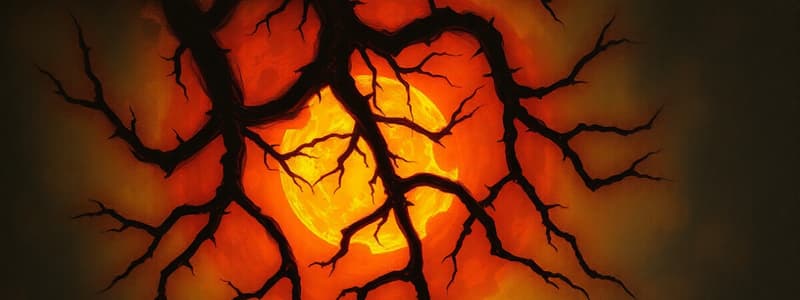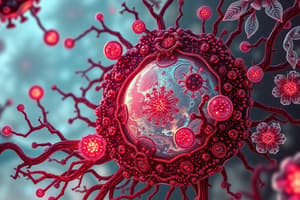Podcast
Questions and Answers
What is the initial stage of cellular response to adverse influences?
What is the initial stage of cellular response to adverse influences?
- Cell death
- Adaptation (correct)
- Irreversible cell injury
- Reversible cell injury
Which of the following is a cause of hypoxia?
Which of the following is a cause of hypoxia?
- Excessive oxygenation of blood
- Inadequate oxygenation of blood (correct)
- Necrosis
- Intracellular accumulation
Which of the following processes is a form of cell death?
Which of the following processes is a form of cell death?
- Reversible cell injury
- Adaptation
- Necrosis (correct)
- Oxidative phosphorylation
The state of homeostasis in normal cells is primarily maintained by:
The state of homeostasis in normal cells is primarily maintained by:
What is a potential consequence of reduced oxygen-carrying capacity of the blood?
What is a potential consequence of reduced oxygen-carrying capacity of the blood?
What might occur if cells experience a prolonged hypoxic state?
What might occur if cells experience a prolonged hypoxic state?
Which stage follows reversible cell injury in the context of cellular impairment?
Which stage follows reversible cell injury in the context of cellular impairment?
Which type of response indicates successful adaptation of a cell?
Which type of response indicates successful adaptation of a cell?
What effect does oxidative stress typically have on cells?
What effect does oxidative stress typically have on cells?
What term describes the impairment from metabolic and structural changes in response to harmful agents?
What term describes the impairment from metabolic and structural changes in response to harmful agents?
Which of the following is classified as a physical agent causing cell injury?
Which of the following is classified as a physical agent causing cell injury?
What is a potential consequence of severe blood loss on cellular function?
What is a potential consequence of severe blood loss on cellular function?
Which of the following nutritional imbalances could lead to cell injury?
Which of the following nutritional imbalances could lead to cell injury?
How does aging affect cellular function?
How does aging affect cellular function?
Which of the following accurately describes irreversible injury?
Which of the following accurately describes irreversible injury?
What triggers reversible cell injury?
What triggers reversible cell injury?
Which agent is considered a biological infectious agent?
Which agent is considered a biological infectious agent?
What is the expected time frame for the consequences of cell injury to become visible with light microscopy?
What is the expected time frame for the consequences of cell injury to become visible with light microscopy?
Which factor does NOT typically contribute to genetic abnormalities leading to cell injury?
Which factor does NOT typically contribute to genetic abnormalities leading to cell injury?
What role do chemical agents have in cell injury?
What role do chemical agents have in cell injury?
Flashcards
Cell Injury
Cell Injury
A set of biochemical and/or morphologic changes when homeostasis is disrupted by adverse influences.
Hypoxia
Hypoxia
Deficiency of oxygen, leading to cell injury from reduced aerobic respiration.
Ischemia
Ischemia
Reduced arterial blood flow.
Homeostasis
Homeostasis
Signup and view all the flashcards
Oxygen Deprivation
Oxygen Deprivation
Signup and view all the flashcards
Causes of Hypoxia
Causes of Hypoxia
Signup and view all the flashcards
Cellular Adaptation
Cellular Adaptation
Signup and view all the flashcards
Reversible Cell Injury
Reversible Cell Injury
Signup and view all the flashcards
Irreversible Cell Injury
Irreversible Cell Injury
Signup and view all the flashcards
Intracellular Accumulation
Intracellular Accumulation
Signup and view all the flashcards
Causes of Cell Injury
Causes of Cell Injury
Signup and view all the flashcards
Physical Agents
Physical Agents
Signup and view all the flashcards
Chemical Agents
Chemical Agents
Signup and view all the flashcards
Infectious/Biological Agents
Infectious/Biological Agents
Signup and view all the flashcards
Immune Reactions
Immune Reactions
Signup and view all the flashcards
Genetic Abnormalities
Genetic Abnormalities
Signup and view all the flashcards
Nutritional Imbalances
Nutritional Imbalances
Signup and view all the flashcards
Aging
Aging
Signup and view all the flashcards
Reversible Injury
Reversible Injury
Signup and view all the flashcards
Irreversible Injury
Irreversible Injury
Signup and view all the flashcards
Study Notes
Cell Injury
- Cells maintain homeostasis through constant biochemical and physiological pathway adjustments.
- Injury occurs when homeostasis is disrupted by adverse influences.
- Cells respond to injury in stages:
- Adaptation
- Reversible cell injury (intracellular accumulation)
- Irreversible cell injury (cell death: necrosis, apoptosis, autophagy)
Causes of Cell Injury
- Oxygen Deprivation (Hypoxia): Reduced aerobic respiration, leading to cellular adaptation, injury, or death depending on severity.
- Causes of hypoxia include inadequate blood oxygenation, reduced oxygen-carrying capacity of the blood (e.g., anemia), carbon monoxide poisoning, and severe blood loss.
Types of Cell Responses
- Figure 1: Illustrates cell responses with increasing severity and duration of stress.
- Adaptation: a response to a stressor, maintains cell survival
- Reversible Injury: Mild, transient, and potentially reversible cellular changes
- Irreversible Injury: Severe, progressive, and leads to cell death (necrosis or apoptosis).
Mechanisms of Cell Injury
- Biochemical Pathways: Injury responses are organized around general principles:
- Cell responses depend on nature, duration, and severity of the stimulus.
- Responses depend on the type, state, and adaptability of the injured cell.
- Injurious stimuli can trigger interconnected cellular damage.
- Intracellular Targets: Injury affects five crucial cellular components: ATP production (mitochondrial respiration), mitochondrial and plasma membrane integrity, protein synthesis and folding/degradation, and genetic material (DNA/RNA) integrity.
- Consequences of ATP Depletion: Impaired membrane transport (Na+/K+ pump dysfunction, calcium influx), increased anaerobic glycolysis, lactic acid production, acidosis, ribosome detachment, and reduced protein synthesis.
- Mitochondrial Damage: Critical for ATP production; dysfunction due to increased calcium, ROS, ischemia, or mutations leading to injury and ultimately cell death.
Defects in Membrane Permeability
- Early and consistent feature of most cell injury is loss of selective membrane permeability,
- Causes of permeability defects : Ischemia, bacterial toxins, viral proteins, complement components, and chemical/physical agents.
- Consequences of membrane damage lead to: mitochondrial/plasma membrane damage, loss of osmotic balance, and leakage of cellular components.
Studying That Suits You
Use AI to generate personalized quizzes and flashcards to suit your learning preferences.



